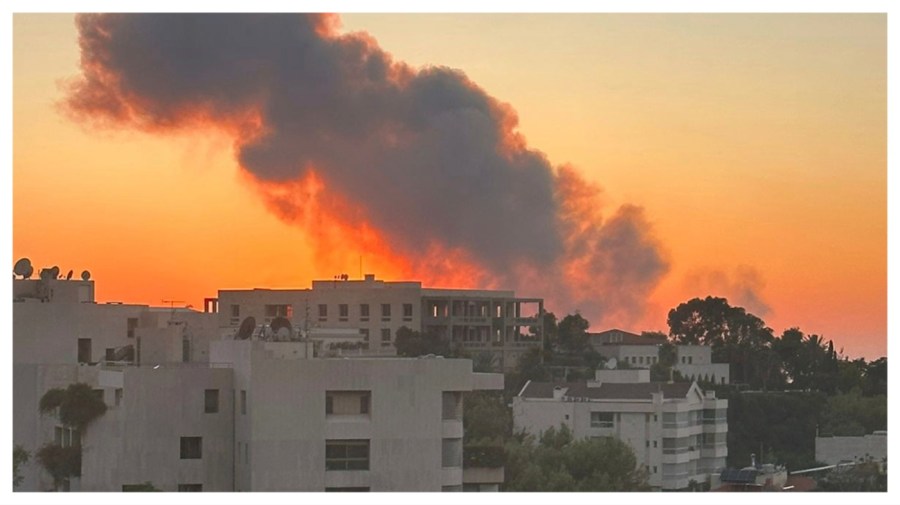
Israel on Friday sought to deal a decisive blow to Hezbollah by targeting the Iranian-backed group’s long-time leader Hassan Nasrallah, underscoring its willingness to escalate warfare in the region to achieve its aims.
It is unclear whether Nasrallah was killed in the Friday strike that on Hezbollah’s central headquarters in Beirut, which toppled several buildings and left plumes of orange and black smoke billowing above the skyline.
Nasrallah has led the U.S.-designated-terrorist group Hezbollah since assuming leadership in 1992 after Israel assassinated his predecessor.
He is a long-time foe of Israel, which has fought two major wars in Lebanon, in 1982 and 2006. Over the past 18 years, Nasrallah has positioned Hezbollah closer to Lebanon’s border with Israel, probing Israel’s defenses and periodically exchanging fire.
A religious cleric, Nasrallah has expanded Hezbollah’s popularity among Lebanese people, institutionalizing its political influence in government and local communities and disciplining its army into a well-resourced and potent fighting force.
“Charismatic, highly intelligent, and deeply religious, his face appears on billboards, key chains, and screensavers; excerpts of his speeches are even used as cell phone ringtones,” the Council of Foreign Relations wrote in a profile in 2010.
A 2006 profile in the Washington Post described Nasrallah as portraying himself as “a man of God, gun and government, a cross between Ayatollah Khomeini and Che Guevera.”
The U.S. considers Hezbollah to be a terrorist group. The Treasury Department, which has sanctions against Nasrallah, lists his date of birth as between 1953 and 1960 in Al Basuriyah, Lebanon.
Nasrallah studied in Islamic seminaries in Iraq and Iran, and trained in military camps in Iran. He joined Hezbollah around its founding during the 1982 Israel-Lebanon war and committed to armed resistance against what would be an 18-year occupation of southern Lebanon.
“We used to discuss issues among ourselves, if we are to expel the Israeli occupation from our country, how do we do this,” Nasrallah told the Washington Post in 2006 about his formative years in the 1980s and 1990s.
“We noticed what happened in Palestine, in the West Bank, in the Gaza Strip, in the Golan, in the Sinai. We reached a conclusion that we cannot rely on the Arab League states, nor on the United Nations. The only way that we have is to take up arms and fight the occupation forces.”
The 2006 Lebanon war was one of the most defining confrontations between Israel and Nasrallah, triggered by Hezbollah’s kidnapping of two Israeli-soldiers across the Israeli-Lebanon border. The Israeli response was so wide-spread and devastating, Nasrallah later admitting he was taken aback by the intensity.
“We did not think, even one percent, that the capture would lead to a war at this time and of this magnitude,” Nasrallah told Lebanon’s New TV channel, according to a Guardian report from the time. “You ask me, if I had known on July 11 … that the operation would lead to such a war, would I do it? I say no, absolutely not.”
An unnamed Israeli official told the New York Times in August 2006 that even though a cease-fire agreement had been reached, Israel had a mark on Nasrallah and intended to kill him.
But over the next nearly two-decades under Nasrallah’s leadership, the Shia-militant group has amassed an arsenal of approximately 150,000 rockets, expended significant resources in building tunnels into Israel (which Israel later destroyed); and gained extensive fighting experience in Syria over the course of its civil war.
Hezbollah receives major financial, technical and diplomatic backing from Iran – which Israel considers its greatest existential threat in the Middle East.
Even as Israel reeled from Hamas’s attack across the border of the Gaza Strip on Oct 7, military units quickly mustered along Israel’s northern border with Lebanon, preparing for Hezbollah to invade the country and occupy its communities there and unleash a rain of rockets.
But Nasrallah made the choice to hold back, green-lighting exchanges of rocketfire with Israel that terrorized communities on both sides of the border but generally contained the fighting to back-and-forth retaliation.
The two sides have traded fire for over a year, with fallout from an increasing number of attacks outpacing efforts at diplomacy.
In late August, Israel said it carried out a preemptive strike to disrupt a major missile and drone attack from Hezbollah. In mid-September, Hezbollah accused Israel of being behind a major attack on its rank-and-file, exploding thousands of pagers, walkie talkies and electronic devises.
On top of this, Israel carried out more air strikes targeting senior leaders of the group – with the IDF saying it killed Ibrahim Aqil, the head of Hezbollah’s military operations; and top commanders of Hezbollah’s elite Radwan Force.
Amid the escalating fighting, the U.S., Canada, and leaders from Europe, and the Middle East, this week issued a joint statement calling for a 21-day truce between Israel and Hezbollah.
Israel rejected the cease-fire and Israeli Prime Minister Benjamin Netanyahu, speaking at the United Nations General Assembly on Friday, said that Israel must defeat Hezbollah in Lebanon.
“Enough is enough,” he said.

